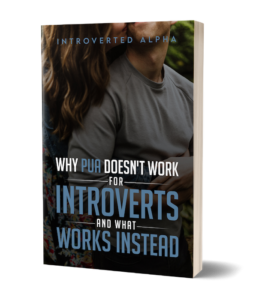Not sure how to end your relationship on a good note?
In this post, we’re going to cover some strategies that will show you how to break up well.
When it comes to a relationship that is reaching its close, many introverted men find themselves searching for a way to work through it as graciously and lovingly as possible.
While in an ideal world you would never have to experience a breakup, statistics (according to the Washington Post) indicate that they are a common reality. Due to the many variables that can complicate the healing process, figuring out how to break up well without the right resources can feel confusing.
Do you feel like you aren’t handling a breakup as well as you’d like to? If so, know that you aren’t the first to feel that way, and you certainly won’t be the last.
If you’re an introverted man who is processing a past breakup or preparing for one around the corner, we tailored these recommendations especially for you.
Do you feel a bit overwhelmed about a past or impending breakup? Today, we’ll…
- Explore why painful feelings arise during a breakup,
- Recommend remedies to help you heal, and
- Provide a better path forward for future breakups.
Although breakups can sometimes feel overwhelming, the great news is that there are simple strategies to make the process easier to manage.
By the end of this post, you’ll know exactly how to process the end of a relationship and part ways on a positive note.
Why is it important to learn how to break up well?
It’s normal for breakups to present you with uncomfortable emotions. Happily, they can also teach you a lot about yourself such as your tendencies, perspectives, and hopes moving forward.
The best way to manage those feelings is to hold onto the truth of who you are and what makes you uniquely you. So, before we go any further, take a moment to complete the exercise in this free ebook.
Many introverted men find that they begin a journey of self-discovery after a relationship ends. That’s where our ebook comes in: to help you build your confidence, stay true to yourself, and honor what makes you unique even as you work through a breakup.
Now, let’s dive into some tips that will help you break up well!
First, learn why breaking up can feel painful.
When you’re experiencing a breakup, the very first thing you need to do is remember that nearly everyone goes through this at one point or another. The next thing to keep in mind is that just because this relationship ended, it doesn’t mean they all will.
And, above all, remember that the pain that comes with breaking up is universal. You aren’t alone in your pain, as the majority of humanity has felt what you’re feeling.
Still, though, we know that the confusion that accompanies the pain can feel just as frustrating as the pain itself.
Instead of analyzing everything you could have done differently, let’s zoom out for a bird’s eye view of why you’re hurting in the first place.
As you and your girlfriend got to know each other better, you shared elements of who you are with one another. During this process, you each validated aspects of the other’s identity and life experience, which solidified your bond.
That bond, which allowed each of you to feel loved and valued, created what is scientifically referred to as an attachment. As the relationship comes to an end and that attachment is severed, it can create a whirlwind of feelings.
For example, the loss may make you both feel vulnerable because it impedes on your sense of self. This can make you feel lonely, lost, or sad. As you begin to experience your partner’s absence, it is only natural that you experience emotional pain.
From there, let’s consider more specifically your situation and the context of your breakup. This will help you experience more closure and clarity based on your breakup experience.
There are 4 general thoughts you may have as a relationship ends:
1: “The relationship wasn’t even that great, so why does this hurt so much?”
If you know that your relationship wasn’t the best fit, you may feel frustrated with your sadness or believe you should only feel relief instead.
Many introverted men are very perceptive when it comes to relationships. They can tell when a relationship doesn’t have long-term potential, and they can see some red flags from a mile away. While this is something that makes you so intuitive and unique, it can sometimes make the pain that follows a breakup feel particularly frustrating.
If this resonates with you, be gentle with yourself as you process the experience. If you feel more emotional pain than you had anticipated, take some time to reflect.
The relationship, no matter how flawed, offered you a sense of familiarity with someone who was attracted to you. You invested time and energy to get used to her being there. You learned to recognize certain things about her scent, her habits, her personality, and her presence. Her decision to be with you was in itself a form of affirmation that you’re someone worth being with.
The sense of loss that comes with any breakup is totally normal. Keep in mind that you are worthy of love and acceptance even without her affirming presence.
2: “I’m the one who broke it off, so why am I in so much pain?”
It takes a lot of courage to end one experience and embark on a new one. Initiating change can make people feel uncertainty, which can be quite uncomfortable, so the fact that you found the courage to voice your authentic feelings is something worth celebrating.
People feel safest with more of the same, so it’s admirable that you left when you knew it wasn’t working. However, the fact that you made the decision doesn’t prevent you from feeling pain.
Of course it’s painful. Someone was there every day, and now she’s not. That hurts.
Furthermore, consider whether you are experiencing empathetic pain for how she may be feeling. Are you worried that she isn’t handling the breakup well or that she is feeling hurt? If so, it can add to the sadness you already feel.
That empathy for the pain of others is a gift. It’s normal to feel sadness for her experience. If anything, this affirms that you care deeply for her as a person.
Meanwhile, it’s also important to maintain healthy boundaries between your pain and hers. The fact that you initiated the breakup doesn’t make her pain your fault. Every person is responsible for their own feelings, reactions, and healing.
You have permission to genuinely hope the best for her without the obligation to carry her pain.
3: “The relationship was the best I ever had. Was I not good enough? Is that why she left me?”
This one hurts because not only are you missing that familiar person, you also would have been happy to stay. You didn’t leave; they left you. So now that sting of rejection is at play as well.
It’s normal to want answers when a good thing ends. This means that you are trying to ascribe meaning to an experience that impacted you deeply, and it’s a healthy response to seek closure as you figure out how to break up well.
Different studies vary on the number of reasons and explanations as to why a relationship ends. The number tends to be between 30 and 50 reasons long, and most breakups can be attributed to a combination of things that either went poorly or just didn’t feel like the right fit.
At this point, many introverted men find themselves analyzing moments of the relationship, even down to small words or facial expressions.
Happily, there’s a better way to process your pain and seek closure introspectively.
The next time you catch yourself with critical self-talk or the assumption that you broke up because you “weren’t good enough,” take a deep breath and pause the inner dialogue.
We’ll help you redirect those thoughts to a more productive route in the next section, when we discuss easing the pain of a breakup!
4: “It was mutual. We were better off apart than we were together.”
This is an ideal breakup situation, though even this one does not always come without pain. Even if you both agreed that separating was the best option, it is still normal to grieve the relationship.
This pain is healthy as you feel the loss of what could have been. The important thing is that you keep a clear sense of who you are without trying to rush through the grieving process. After that, stay focused on what you’re looking for and keep your hopes up as you look forward.
Now that you have a better idea of where your emotional responses are coming from, it’s time to consider how to remedy the hurt.
Next, explore how you can ease the pain of a breakup.
We cannot emphasize this part enough! It is so important that you extend love to that person in your heart. Feel grateful for the role they played in your life and the one they allowed you to have in theirs.
Even when it’s not perfect, it is still special to be intimate with someone. It doesn’t mean that things need to continue; it just means you can let things be complete while also wishing that person nothing but the best.
That might take time, and it’s normal to experience some hard feelings at first, especially if you didn’t want to break up. Take your time and know that you can’t rush through the forgiveness process. This step is not something to force; rather, it’s something to look forward to with time and perspective.
When you take the time to extend love to that person and to yourself even in your pain, you’re setting yourself up to end a relationship well by connecting with yourself deeply.
As we mentioned in the previous section, it can be tempting to analyze all of the little things.
Instead of focusing on negatives, list all of the things you learned or grew from throughout your relationship.
For example, you may have learned more about…
- What you’re looking for in a woman
- Your expectations in various scenarios
- Preferences when it comes to conflict or disagreement
- How to recognize a red flag you didn’t know about before
- Your own communication style
- New activities that you wouldn’t have tried if she hadn’t shown you
- Things that are deal-breakers for you
- Something you didn’t realize was so important to you
This process has the potential to generate a healthy mindset concerning relationships, improve your approach if you experience a breakup in the future, and provide you with a meaningful opportunity to grow personally.
Even if you struggle to extend love to that person for how they treated you or behaved during the relationship, this process of listing the positive things you took from the experience can help you extend gratitude to them and the opportunity they gave you to grow, as well as feel empowered as you look back on the entire relationship.
Finally, consider how to break up well in the future.
One of the things introverted men find most challenging about breaking up is that it requires entering a conversation that may be confusing or hurtful.
Happily, in this article about exclusivity, we covered some tips when it comes to a conversation for the ideal breakup. Here are a few tips from that article:
Option 1: If you’re not very close yet, it’s better for both of you if you let things taper off naturally.
Option 2: If you’ve developed a closer relationship and it wouldn’t feel right to just go silent, you can tell her gently and clearly through a phone call or in-person conversation.
You can communicate that you’ve enjoyed getting to know her and that you don’t think you two will see each other again. Tell her something nice you noticed about her, and wish her all the best in her future.
Final thoughts on how to end a relationship well

Let’s review what we went over today…
- Why breaking up can feel painful,
- How to ease the pain of a breakup, and
- Ways you can break up well in the future
In order to make sure you can maintain a solid, positive sense of self, download our free ebook. Inside, you’ll find an exercise that will help you better understand and embrace your best traits. This self-knowledge will be a helpful anchor through any breakup. Get your copy here.
Sometimes, especially when it comes to breakups, we understand that your experience requires more in-depth guidance and steady support. If that resonates with you, consider letting us help you in a personalized, customized way through our Launch Your Dating Life program.
This includes 12 weeks of in-depth training modules, 12 weekly full-hour one-on-one coaching sessions with your own dedicated IA coach, and unlimited email support. Apply here so we can see if this program is right for you!










